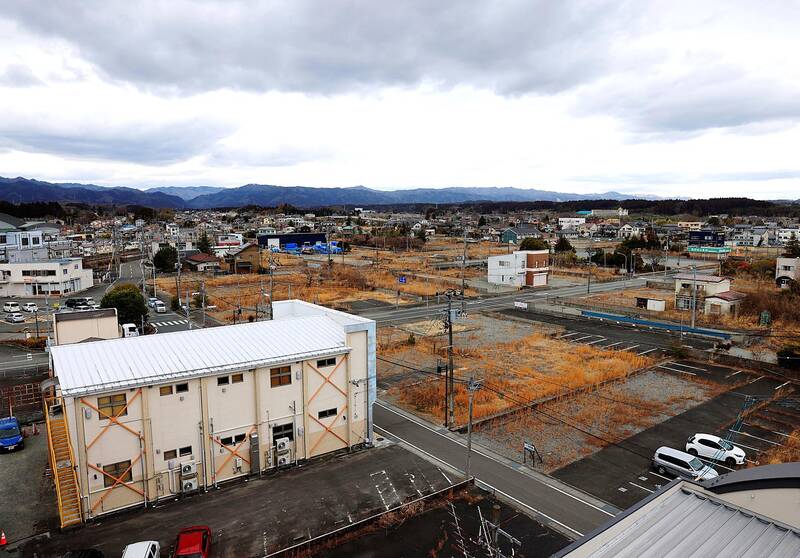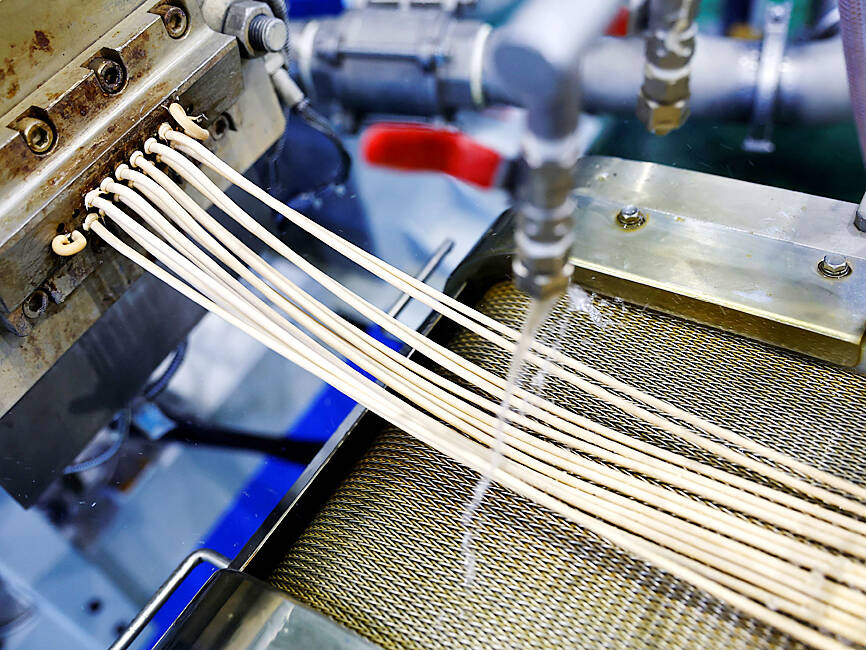Jinichi Abe grinned as he watched diggers working earth near his rice fields, knowing they were returning still more fields to productivity after reactors at the Fukushima Dai-ichi nuclear power plant exploded and sprayed the area with radiation more than a decade ago.
Even better, Abe knew the rice that he and a cooperative grow would have a steady buyer, and his town of Namie, still struggling to recover from the March 2011 disaster, had a new hope: a venture that turns rice unsellable for consumption due to health worries into low-carbon plastic used by major firms across Japan.
In November last year, Tokyo-based firm Biomass Resin opened a factory in Namie to turn locally grown rice into pellets. The raw materials are reborn as low-carbon plastic cutlery and takeout containers used in chain restaurants, plastic bags at post offices and souvenirs sold at one of Japan’s largest international airports.

Photo: Reuters
“Without growing rice, this town can’t recover,” said Abe, 85, a 13th-generation farmer, who said the rice — unsellable due to rumors — had been used as animal feed, among other uses, in previous years.
“Even now, we can’t sell it as Fukushima rice... So having Biomass come was a huge help. We can grow rice without worries,” he said.
Spreading down from the forested slopes of the mountains to the ocean side, parts of Namie lie only 4km from the Fukushima power plant run by Tokyo Electric Power Co (TEPCO), which provided jobs for many — including Abe’s son and grandson. The plant’s chimneys are clearly visible from Ukedo beach, below a primary school gutted by the March 11, 2011, tsunami.

Photo: Reuters
The same wave slammed into the nuclear plant, setting off meltdowns and explosions. Namie residents first evacuated inland on March 12, but then, as radiation levels rose, were ordered out of town altogether with little more than the clothes they wore.
Nobody was allowed back to live until 2017, after decontamination efforts that left tonnes of radioactive soil stored around the town for years, including in the fields across from Abe’s. About 80 percent of the town’s land remains off-limits and not quite 2,000 people live there, compared with 21,000 previously.
There is one major shopping center, one clinic, two dentists, one combined primary and junior high school — and a dearth of jobs. In better times, there had been a thriving pottery business, and farming, along the coastal plain.
“Fundamentally, we want businesses that will create as many jobs as possible — basically, manufacturing,” said town official Satoshi Konno, who admitted things are “still tough.”
Since 2017, eight companies have come in, including a concrete plant, aquaculture and an electric vehicle battery recycler, generating about 200 jobs. Discussions are under way with others and research institutes might bring still more people.
Biomass Resin, whose tidy factory sits on land originally set aside for another nuclear plant, is one of the newest.
“Namie was hit by four disasters — the quake, the tsunami, the reactor accident and then rumors about radiation danger,” Biomass Resin Fukushima president Takemitsu Imazu said.
“It’s mostly recovered from the quake and tsunami, but the other two are still heavy burdens... By building our factory here, we want to bring jobs and invite people back,” he said.
A toasted rice aroma hangs around the factory line, where rice is combined with small plastic beads, heated and kneaded before being extruded in thin rods that are cooled and cut into tiny brown pellets. The pellets, either 50 percent or 70 percent rice, are then sent to companies that manufacture plastic goods.
The plastic is not biodegradable, Imazu said, but using rice cuts the petroleum products involved — and growing more rice in Namie reduces overall atmospheric carbon dioxide.
Atomic contamination experts said rice naturally takes up little radioactive cesium. Additional testing has found no rice above strict limits, meaning the plastic is fine, too.
“There’s no safety issue,” said Atsushi Nakao, associate professor at Kyoto Prefectural University. “I really regret the rice isn’t consumed due to safety rumors, but I also understand it’s hard to completely refute aversions.”
Biomass Resin employs 10 people in Namie, including a 20-year-old who returned, and hopes to expand. It uses only about 50 tonnes of Namie rice — the rest of the 1,500 tonnes needed is mainly from elsewhere in Fukushima — but would buy more next year from Abe and his cooperative, grown on the freshly cleared fields.
Abe, whose son would soon retire from TEPCO and join him growing rice, was hopeful.
“This is an important thing to keep Namie going, a really good thing for the town,” he said.

Swedish campaigner Greta Thunberg was deported from Israel yesterday, the Israeli Ministry of Foreign Affairs said, the day after the Israeli navy prevented her and a group of fellow pro-Palestinian activists from sailing to Gaza. Thunberg, 22, was put on a flight to France, the ministry said, adding that she would travel on to Sweden from there. Three other people who had been aboard the charity vessel also agreed to immediate repatriation. Eight other crew members are contesting their deportation order, Israeli rights group Adalah, which advised them, said in a statement. They are being held at a detention center ahead of a

A Chinese scientist was arrested while arriving in the US at Detroit airport, the second case in days involving the alleged smuggling of biological material, authorities said on Monday. The scientist is accused of shipping biological material months ago to staff at a laboratory at the University of Michigan. The FBI, in a court filing, described it as material related to certain worms and requires a government permit. “The guidelines for importing biological materials into the US for research purposes are stringent, but clear, and actions like this undermine the legitimate work of other visiting scholars,” said John Nowak, who leads field

NUCLEAR WARNING: Elites are carelessly fomenting fear and tensions between nuclear powers, perhaps because they have access to shelters, Tulsi Gabbard said After a trip to Hiroshima, US Director of National Intelligence Tulsi Gabbard on Tuesday warned that “warmongers” were pushing the world to the brink of nuclear war. Gabbard did not specify her concerns. Gabbard posted on social media a video of grisly footage from the world’s first nuclear attack and of her staring reflectively at the Hiroshima Peace Memorial. On Aug. 6, 1945, the US obliterated Hiroshima, killing 140,000 people in the explosion and by the end of the year from the uranium bomb’s effects. Three days later, a US plane dropped a plutonium bomb on Nagasaki, leaving abut 74,000 people dead by the

Indian Prime Minister Narendra Modi is to visit Canada next week, his first since relations plummeted after the assassination of a Canadian Sikh separatist in Vancouver, triggering diplomatic expulsions and hitting trade. Analysts hope it is a step toward repairing ties that soured in 2023, after then-Canadian prime minister Justin Trudeau pointed the finger at New Delhi’s involvement in murdering Hardeep Singh Nijjar, claims India furiously denied. An invitation extended by new Canadian Prime Minister Mark Carney to Modi to attend the G7 leaders summit in Canada offers a chance to “reset” relations, former Indian diplomat Harsh Vardhan Shringla said. “This is a